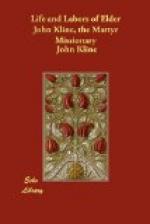Do not imagine that God, our Creator, took a spell of love and good will when he sent his Son into the world. God does not take spells, either of love or wrath. He is the same yesterday, to-day and forevermore. The same God who brought destruction upon the disobedient, wayward, unthankful tribes of Israel, is the God who so loved the world. He loved it then, just as he loves it now. He loves it now, just as he did when he sent his Son to die for its sins. But let us inquire a little further into the nature of the
DIVINE WRATH.
When I am crossing deep water I always find it best to be calm, go slowly and steadily, and look well to the point where I expect to land. The wrath of God is such only in appearance. The real wrath is in man, and upon man. Let me explain this. Our blessed Savior says: “Be ye therefore perfect even as your Father which is in heaven is perfect:” “for he maketh his sun to rise on the evil and on the good, and sendeth rain on the just and on the unjust.”
There lies a man who gave himself up to intemperance. Alcohol had permeated his body, carrying its deadly poison into every nerve, and fibre, and tissue of his entire organism. He exposed himself to the sun’s rays on a very hot day, and he fell dead from sunstroke. The WRATH of the sun destroyed his life. God made the sun to rise on the morning of that day; and God filled the sun with its heat; but it was wrathful to the man who was not prepared for it, and to no one else. Nature everywhere rejoiced in its light and heat; the corn grew; the hay was cured; and devout hearts thanked the Lord for that lovely day.
Right there, on that sand, is where a man once built his house. He was told by many that it was not a safe place to build a dwelling house, that it would certainly be in danger of being swept away by high water. He would not hear, but went on building; and finally he moved in. But great WRATH came upon him; for in one night his house, with all in it, including himself, was washed away. Wise people all over the land rejoiced to see the rain. It had been a dry time, and everybody said: “What a fine rain! It has replenished our wells and flushed up our springs. The mills can now start up again. When the ground dries off a little people can go to plowing again.” But this very same rain was destruction and WRATH to the foolish man who had built his house in the way of its flood.
You may now better understand what I mean by saying that the wrath of God is not wrath as we usually understand the word to mean; but wrath only in appearance. The Lord did not send the flood to destroy that man’s house; the flood was just as necessary as the rain, and its end quite as benevolent. The destruction of the man’s house was purely the result of his own folly.




